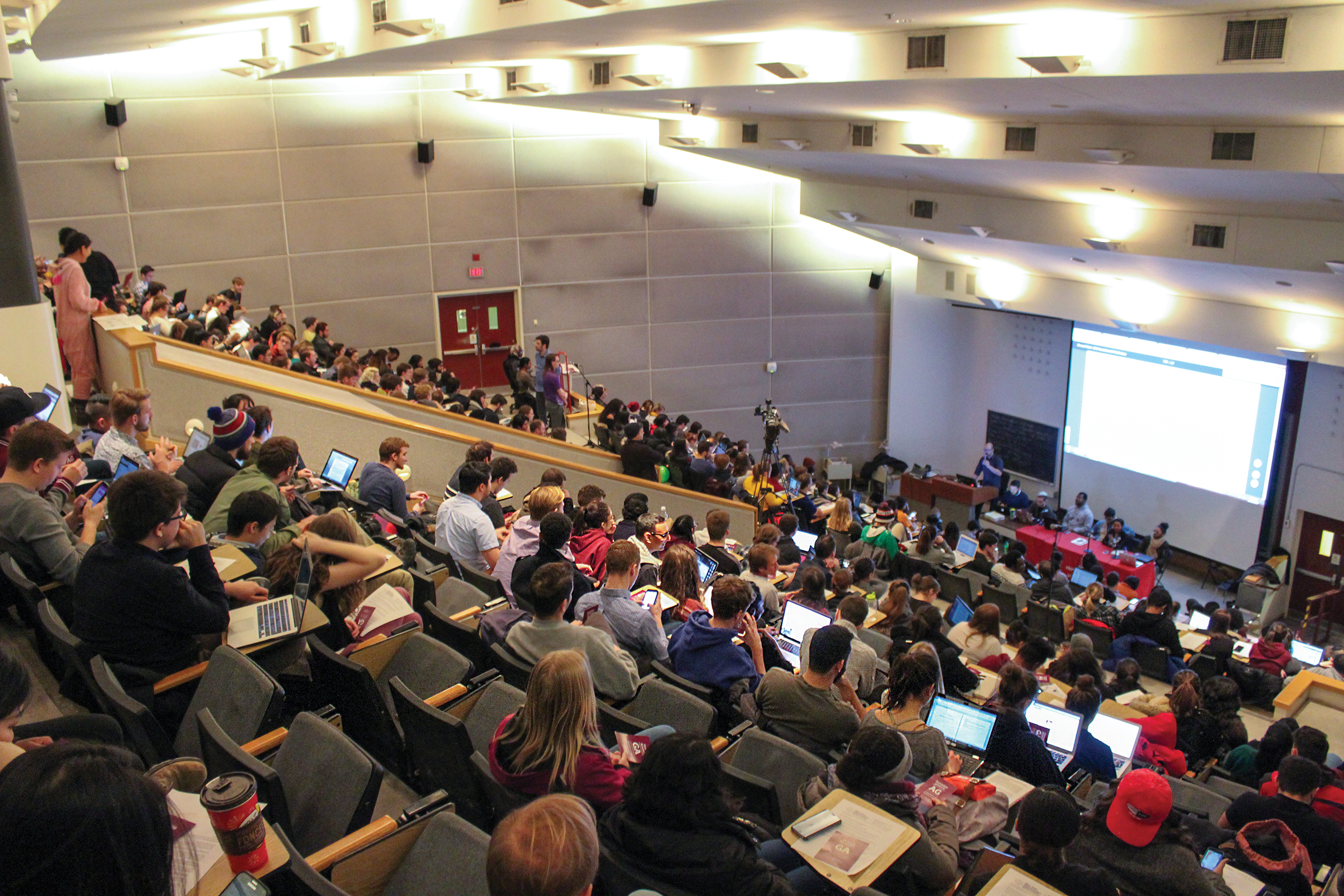In an unprecedented showing of political engagement at the University of Ottawa, over 280 students came out to the March 14 Student Federation of the University of Ottawa (SFUO) General Assembly (GA), and motions were debated as the GA met quorum for the first time since its inception in November 2014.
A clear point of concern among attendees of this GA was the SFUO executive salary raises, which resulted from a motion proposed by current and incoming vice-president of finance Rizki Rachiq being passed at the March 12 Board of Administration (BOA) meeting.
This action by the board came shortly after the rejection of a similar motion to increase the wages of SFUO employees to a $15 minimum wage at an earlier BOA meeting, and during a year where the SFUO has cut club funding, services, and the social budget as part of austerity measures.
On the night of the GA, once chairperson Shawn Philip Hunsdale read the agenda, students immediately demanded an amendment in order to discuss the executive salary raise. With a vote in favour of adding the executive salary discussion to the agenda, students took the opportunity to pointedly voice their discontent with this decision made by the BOA.
One can only hope that the SFUO’s BOA will take these concerns seriously, given their role in ensuring the SFUO meets their mission of “post-secondary education which recognizes the legitimacy and validity of student rights and representation.”
Even though the SFUO cannot vote against the will of the students at the next BOA meeting, since the salary increase is not technically a policy or bylaw issue, we wouldn’t be surprised if they trotted out some obscure rule or regulation to further their own agenda. The fact we feel the need to write this editorial speaks volumes about student trust in the SFUO.
But if the SFUO wants to convince students that they have any legitimate influence in the affairs of their own federation, they must uphold the decision made at the GA to reverse the salary increases. The GA, once the highest decision-making body of our student federation, is one of the few chances students have to make their voice heard by the SFUO executive. If student voices aren’t respected or held as a significant factor in the federation’s decision-making process, there is very little reason for students to believe in their federation.
After all, the SFUO only exists in order to defend the rights of students who put their hard-earned money towards this academic institution—and we pay for that defence every semester in our tuition bill. If the SFUO is going to operate autonomously from the very population that gives it a reason to exist, why buy into this system at all?
You might argue that students don’t understand the complexity of the decision making behind the pay raise. And maybe you’re right! But if anything has become clear in the Fulcrum’s constant coverage of the SFUO’s BOA meetings, supporting documentation for oral reports and other activity at the meetings are incredibly difficult to access. Not to mention complaints around the lack of availability of SFUO executives, specifically—you guessed it!—Rachiq not holding enough meetings with the federated bodies’ vice-presidents of finance.
If what Rachiq says in this executive salary motion is true, and SFUO execs really and truly are making less than the average hourly wage of student federation execs across the country, the onus is on him to reach out to the student body and convince them of that using his financial reports.
Unsurprisingly, this isn’t what happened. Rachiq presented a case to the BOA and executive—a case which had questionable legitimacy—but didn’t do enough outreach to explain his motion to the student body, made clear by the immense turnout opposing his motion at the GA.
Although it might sound like we’re stating the obvious, the Fulcrum believes that it’s time that the SFUO executives and BOA remember who it is they’re meant to serve. Presenting a motion to raise executive salaries, after quickly dismissing a motion to bring SFUO staff salaries up to a living wage and failing to consult properly with the student body, comes across as underhanded and authoritarian.
Since Rachiq will be returning to the SFUO executive next year as vice-president of finance, he would do well to start engaging students, or at least the VP finances of federated bodies, on major changes in the SFUO’s financial strategy. It should be common sense that a motion to increase executive salaries by a large margin might not be well-received if not well-explained—so make the effort to reach out and find a middle ground.
When our student government takes the time to perform their basic duty of engaging and consulting with their constituency, perhaps the SFUO will once again function as a democratic structure.
But if the SFUO exec continues to forgo student consultation, attempts to pass controversial motions at BOA meetings, all while hoping that students won’t notice these motions in the U of O’s student media or will be too busy to voice their opinion at the GAs, they will continue to operate autonomously from its own constituency. And if that’s the case, then why have a student federation in the first place?
This is why we, the Fulcrum, are calling on the SFUO’s BOA to uphold the motion passed by students who attended the GA to reverse the executive salary increase. Your status as a democratic institution will be stronger for it.





